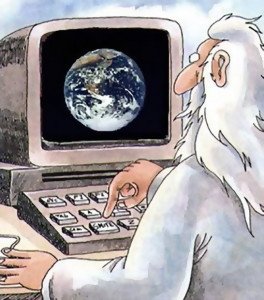
by gcadmin on Saturday, February 9th, 2019 No Comments
I just watched Bishop Barron’s great discussion of Hawkings recent book (here). I had my own thoughts.
Stephen Hawking is wrong.
He can’t prove God does not exist.

Hawking says explicitly “I think the universe was spontaneously created out of nothing according to the laws of science” and then he later says “the laws of nature itself tell us that not only could the universe have popped into existence without any assistance, like a proton”, and have required *nothing* in terms of energy but also that it is possible that *nothing* caused the Big Bang – *nothing*“
The simplest flaw, the most obvious flaw, in this thinking is that it is not provable. There is no scientific evidence or theory that can confirm this. Hawking however then states that there is no need for God to exist. Clear logic shows you can not use a ‘maybe true claim’ to then concluded a ‘maybe true statement’.
The more fundamental flaw is that Hawking is conflating the Physical and scientifically observable ‘Nothing’ (ie the absence of anything we can detect or think of), with the deeper philosophical ‘Nothing’ – total absence of *everything* including scientific laws and laws of nature. The fallacy appears even in the first sentence –
‘created out of nothing – according to the laws of science’.
True ‘Nothing’ would be outside the universe, outside the ‘laws of science’.

Using my technical ‘GC’ lense, let me use a Computer analogy to help focus our understanding and flaws in Hawking’s thinking.
Like a computer – the programs running only experience time with the tick of the Hardware clock. Each ‘tick’ lets the computer CPU and programs execute code and which advances instructions.
Stop the Clock and you stop Time
We are in a time where Artificial Intelligence (AI) is a given – It is clear at some stage AI will equal and perhaps surpass our own intelligence. Let’s assume that an AI has the same intelligence.
Now this AI is running on a big computer, and let’s say it is your computer. On your computer it is possible to stop time by stopping the clock. You could do this by cutting a lead on the motherboard, or like when I was in University research I had used a lab computer where the clock speed was controlled by a variable resistor – I could speed the clock up and slow it right down.
I could actually even stop the clock.
I could make it appear to the programs running on this computer that time had stopped. That between one instruction and the next would be minutes or hours – or forever.
The software would think and see time had stopped.
The software would have no idea when or even if the next clock tick would happen.
The software does not see, cannot see the hardware or the hardware clock.
For the AI, the artificial life form on the computer – You stopped time, you are outside it’s existence you control the AIs very ‘being’. You, for all intents and purposes are God for the AI.
Assume in this setup, we have a ‘Stephen Hawking’ facsimile and it is running as software on the computer. This facsimile then argues there is nothing outside the program and time is an attribute of the program.
Clearly the AI would be wrong. We can see the hardware clock, we can speed it up, slow it down. We can stop ‘Stephen Hawking’ from running – and it would not even know.
Let me re-phrase that – the software running on the computer is only running because there are external components, clocks, memory, electricity that is letting the computer operate and the simulation to run. The simulation ‘Hawking’ cannot see or know anything about this. To the simulation we are as powerful As God. The simulated ‘Hawking’ however is saying it can exist without us? Saying it doesn’t need the computer or clock to run.
The simulated ‘Hawking’ is wrong.
I’ve just created a virtual world – but what came before?
Here is another example.
Let’s say we build a new virtual machine (VM). Until we hit the run button to load the newly created VM, the software, the virtual machine is not running.
When we do start it, suddenly it’s running. If the software inside the VM, say our Artificial Intelligent being from before, argued there is nothing before the start of the virtual machine, then again we would see that it was wrong.
Similarly Hawking saying he can prove that there is “nothing” before the Big Bang is incorrect. It can’t be proven, nor does it even make sense.
It is easy to define things in our world as contingent (dependent) on for their existence. You can do this for anything including yourself. For example you depend on your parents, food, air, water and shelter. Each of those depends on other things. Eventually as you go backwards you might end up at the atomic (or sub-atomic level). Something depends on the atoms which came from exploding stars billions of years ago. Those stars depend on the matter which came to existence at the start of the universe. Now here is the crux, you always arrive at this question:
What does the universe depend on?
The answer is simple God. The creator, the being that is outside the universe.
Although I can’t prove it with science, neither can anyone, including Stephen Hawking disprove it.
#BeGrateful #Gratitude #Gravitas
Virtual World’s – What if we are in one – should we be good?
Bishop Barron’s discussion about Stephen Hawking’s ideas great:
Posted in Computer Technical, Creator, GCLens.